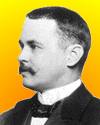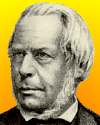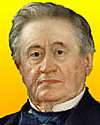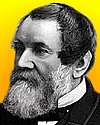 | TODAY IN SCIENCE HISTORY
NEWSLETTER - 13 MAY |
 On 13 May 1857, Ronald Ross was born, who became the first Briton to become a Nobelist. He was awarded the Nobel Prize in 1902 for his work on malaria, about which he made a significant discovery concerning its mode of transmission. On 13 May 1857, Ronald Ross was born, who became the first Briton to become a Nobelist. He was awarded the Nobel Prize in 1902 for his work on malaria, about which he made a significant discovery concerning its mode of transmission.
In 1899, he published a pamphlet titled Instructions For the Prevention of Malarial Fever For the Use of Residents of Malarious Places. This forms an excellent short article for readers of the Feature for Today to enjoy "in his own words." |
 On 13 May 1884, Cyrus Hall McCormick died. His father had been unsuccessful, after years of trying, to produce a successful machine for a certain task. Cyrus some years later was successful in that goal, and in 1843 participated in a widely publicized competition against a rival. By winning he had a heathy promotional start for his manufacturing business for that machine, and he remains recognized for developing its first commercially successful design. (Which machine was that. Well it's the question in the quiz below.) To day's Science Store pick is: Cyrus Hall McCormick: His Life and Work , by Herbert N. Casson. McCormick lived in that heroic period of industrial advancement, vhen great things were done by great individuals. Chances are, his name is familiar to you, and you found it easy to name his invention in the quiz below. In which case you know how important revolutionary it was. And yet, he was a decent man that contrasts with the behaviour of many of the other industrial barons of his era. That aspect of his life may be unfamiliar to you, and that is a good reason to look more extensively into this great man's biography! Illustrated edition. New Price $34.95. Also available Used from $15.99 (as of time of writing). On 13 May 1884, Cyrus Hall McCormick died. His father had been unsuccessful, after years of trying, to produce a successful machine for a certain task. Cyrus some years later was successful in that goal, and in 1843 participated in a widely publicized competition against a rival. By winning he had a heathy promotional start for his manufacturing business for that machine, and he remains recognized for developing its first commercially successful design. (Which machine was that. Well it's the question in the quiz below.) To day's Science Store pick is: Cyrus Hall McCormick: His Life and Work , by Herbert N. Casson. McCormick lived in that heroic period of industrial advancement, vhen great things were done by great individuals. Chances are, his name is familiar to you, and you found it easy to name his invention in the quiz below. In which case you know how important revolutionary it was. And yet, he was a decent man that contrasts with the behaviour of many of the other industrial barons of his era. That aspect of his life may be unfamiliar to you, and that is a good reason to look more extensively into this great man's biography! Illustrated edition. New Price $34.95. Also available Used from $15.99 (as of time of writing). Yesterday's pick: Dorothy Hodgkin: A Life, by Georgina Ferry
For picks from earlier newsletters, see the Today in Science Science Store home page. | |
 | "The Panama Canal was dug with a microscope."
- Sir Ronald Ross, attributed, English physician and bacteriologist (born 13 May 1857)  |

| "I, however, believe that for the ripening of experience the light of an intelligent theory is required. People are amused by the witticism that the man with a theory forces from nature that answer to his question which he wishes to have but nature never answers unless she is questioned, or to speak more accurately, she is always talking to us and with a thousand tongues but we only catch the answer to our own question."
- Friedrich Gustav Jacob de Henle, German pathologist and anatomist (died 13 May 1885)  |
 | "The seeds of great discoveries are constantly floating around us, but they only take root in minds well-prepared to receive them." - American physicist in the quiz below (died 13 May 1878)  |
| Before you look at today's web page, see if you can answer some of these questions about the events that happened on this day. Some of the names are very familiar. Others will likely stump you. Tickle your curiosity with these questions, then check your answers on today's web page. |

|  Sir Ronald Ross, born 13 May 1857 was a British bacteriologist who received the Nobel Prize for Physiology or Medicine in 1902 for his work on malaria. Sir Ronald Ross, born 13 May 1857 was a British bacteriologist who received the Nobel Prize for Physiology or Medicine in 1902 for his work on malaria.
 What did he find about the way in which malaria is transmitted? What did he find about the way in which malaria is transmitted? |

|  Cyrus Hall McCormick, an American industrialist and inventor (1809-1884) is generally credited with the development of the first commercially succesful design for a certain type of machine. To establish its functionality, he participated in a widely publicized competition with a rival, which he won. This launched his manufacturing business. Cyrus Hall McCormick, an American industrialist and inventor (1809-1884) is generally credited with the development of the first commercially succesful design for a certain type of machine. To establish its functionality, he participated in a widely publicized competition with a rival, which he won. This launched his manufacturing business.
 Can you name his important inventionr? Can you name his important inventionr? |

|  An American scientist (1797-1878) was one of the first great ones after Benjamin Franklin. He was also the first secretary of the Smithsonian Institution. But it was his discovery of self-inductance for which he is most remembered and his name is now used for the SI the unit of inductance. An American scientist (1797-1878) was one of the first great ones after Benjamin Franklin. He was also the first secretary of the Smithsonian Institution. But it was his discovery of self-inductance for which he is most remembered and his name is now used for the SI the unit of inductance.
 Can you name this man? Can you name this man? |
|  In 1958, the trademark name for a certain new type of fastener was registered in the U.S. The inventor was inspired by burrs sticking to his clothes. In 1958, the trademark name for a certain new type of fastener was registered in the U.S. The inventor was inspired by burrs sticking to his clothes.
 What is the name of this fastener? |
|  In 1913, Igor Sikorsky of Russia built and flew an airplane with a certain number of engines In 1913, Igor Sikorsky of Russia built and flew an airplane with a certain number of engines
 How many engines were on this first airplane of its type? |
|  In 1637, Cardinal Richelieu in France created a replacement for the dagger, in at least this civilized use. He had the points rounded off. In 1637, Cardinal Richelieu in France created a replacement for the dagger, in at least this civilized use. He had the points rounded off.
 What was the use for his new design? |
When you have your answers ready to all the questions above, you'll find all the information to check them, and more, on the May 13 web page of Today in Science History. Or, try this link first for just the brief answers.
Fast answers for the previous newsletter for May 12: penicillin, vitamin B-12; Justus Liebig; polytetrafluoroethylene - Teflon; nitrogen; Dvorak; the decade including the year 1886; eagle.
|
 If you enjoy this newsletter, the website, or wish to offer encouragement or ideas, please send feedback by using your mail reader Reply button. If you enjoy this newsletter, the website, or wish to offer encouragement or ideas, please send feedback by using your mail reader Reply button. |
--
If you do not want to receive any more newsletters,
Unsubscribe To update your preferences and to unsubscribe visit
this link 


 On 13 May 1857, Ronald Ross was born, who became the first Briton to become a Nobelist. He was awarded the Nobel Prize in 1902 for his work on malaria, about which he made a significant discovery concerning its mode of transmission.
On 13 May 1857, Ronald Ross was born, who became the first Briton to become a Nobelist. He was awarded the Nobel Prize in 1902 for his work on malaria, about which he made a significant discovery concerning its mode of transmission.



 Sir Ronald Ross, born 13 May 1857 was a British bacteriologist who received the Nobel Prize for Physiology or Medicine in 1902 for his work on malaria.
Sir Ronald Ross, born 13 May 1857 was a British bacteriologist who received the Nobel Prize for Physiology or Medicine in 1902 for his work on malaria. What did he find about the way in which malaria is transmitted?
What did he find about the way in which malaria is transmitted?
 Cyrus Hall McCormick, an American industrialist and inventor (1809-1884) is generally credited with the development of the first commercially succesful design for a certain type of machine. To establish its functionality, he participated in a widely publicized competition with a rival, which he won. This launched his manufacturing business.
Cyrus Hall McCormick, an American industrialist and inventor (1809-1884) is generally credited with the development of the first commercially succesful design for a certain type of machine. To establish its functionality, he participated in a widely publicized competition with a rival, which he won. This launched his manufacturing business. Can you name his important inventionr?
Can you name his important inventionr? 
 An American scientist (1797-1878) was one of the first great ones after Benjamin Franklin. He was also the first secretary of the Smithsonian Institution. But it was his discovery of self-inductance for which he is most remembered and his name is now used for the SI the unit of inductance.
An American scientist (1797-1878) was one of the first great ones after Benjamin Franklin. He was also the first secretary of the Smithsonian Institution. But it was his discovery of self-inductance for which he is most remembered and his name is now used for the SI the unit of inductance. Can you name this man?
Can you name this man?  In 1958, the trademark name for a certain new type of fastener was registered in the U.S. The inventor was inspired by burrs sticking to his clothes.
In 1958, the trademark name for a certain new type of fastener was registered in the U.S. The inventor was inspired by burrs sticking to his clothes. What is the name of this fastener?
What is the name of this fastener? In 1913, Igor Sikorsky of Russia built and flew an airplane with a certain number of engines
In 1913, Igor Sikorsky of Russia built and flew an airplane with a certain number of engines How many engines were on this first airplane of its type?
How many engines were on this first airplane of its type? In 1637, Cardinal Richelieu in France created a replacement for the dagger, in at least this civilized use. He had the points rounded off.
In 1637, Cardinal Richelieu in France created a replacement for the dagger, in at least this civilized use. He had the points rounded off. What was the use for his new design?
What was the use for his new design? If you enjoy this newsletter, the website, or wish to offer encouragement or ideas, please send feedback by using your mail reader Reply button.
If you enjoy this newsletter, the website, or wish to offer encouragement or ideas, please send feedback by using your mail reader Reply button. 

Δεν υπάρχουν σχόλια:
Δημοσίευση σχολίου